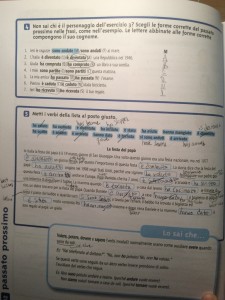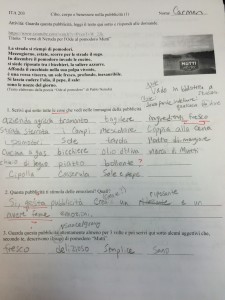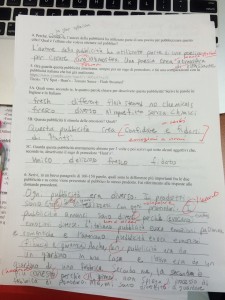There was a moment in the beginning of Italian 203 that I remember distinctly. Professor Casa gave directions, and, while I understood her meaning clearly, shortly after she spoke I could not say with absolute certainty whether she had spoken in Italian or English. Prior to this moment, I had mostly been literally translating from Italian to English, adding exceptions for when Italian form differed greatly from English form.
After this instance I realized that to truly know Italian, I would need to let the base meaning take primacy over the English translation. I set a goal to speak and understand all Italian without consciously thinking of the corresponding English. While this may seem superficial, I feel separating myself from my native language helped me view the world more objectively and truly empathize with others’ viewpoints.
In pursuit of this objective, I first learned how to better understand the ideas and opinions of others while also expressing myself more effectively. I enjoyed a lot of the work in the first half of the semester where we first started seriously discussing our own opinions and how they relate to differing viewpoints. Learning the subjunctive tense near the end of this half was an important feature of this development, but even before being taught subjunctive we were discussing ideas in more sophisticated ways than we had in previous Italian classes.
One of my favorite assignments was actually the reading that discussed differing opinions on the Slow Food movement. Sometimes I felt like the teaching of Italian culture was a little one dimensional, detailing how all Italians tend to think or act. This assignment, though, showcased the collage of thoughts and opinions that encompass the Italian national dialogue. It offered a glimpse at the complexity of Italian culture and showed how much we had still to learn. I would love to read more about the social and economic debates that are happening in Italy.
As the semester progressed I feel that, while I kept developing how to better express my opinion, we began to delve into how Italian culture is primarily a unifying force. Learning about the Italian university system highlighted some of the values that Italians share, such as oral proficiency. I really enjoyed interviewing Kay about her perception of American culture and her favorite aspects of Italian culture. A lot of what she missed about Italy corresponded to what we were learning about Italian values in class. Additionally, in Mezzanotte e la Tribú, the band is brought together when they realize how they share a strong Italian culture.
Before starting Italian, I found it strange that Duke would require all Trinity students to take three semesters of a language. Undoubtedly, though, I am glad that there is a language learning requirement. Separating myself from English and truly beginning to understand Italian has made accessible a host of new and interesting opinions, viewpoints, and ideas that I look forward to exploring. Conversely, examining Italian grammar in more detail this semester has changed the way I think about reading and writing in English. Lastly, learning about Italian culture has showed me which parts of myself are distinctly American and which are influenced by aspects of Italian culture that my mother has carried on from her parents.








